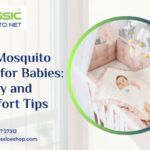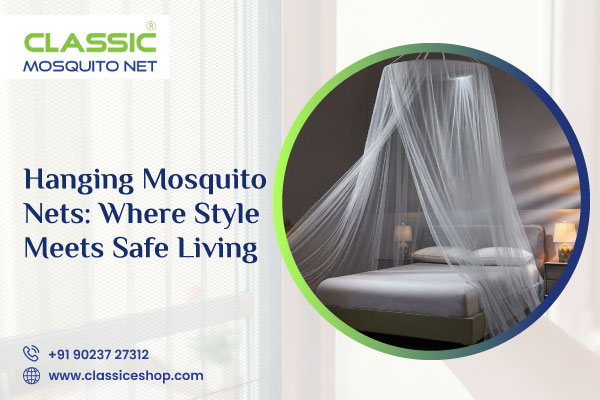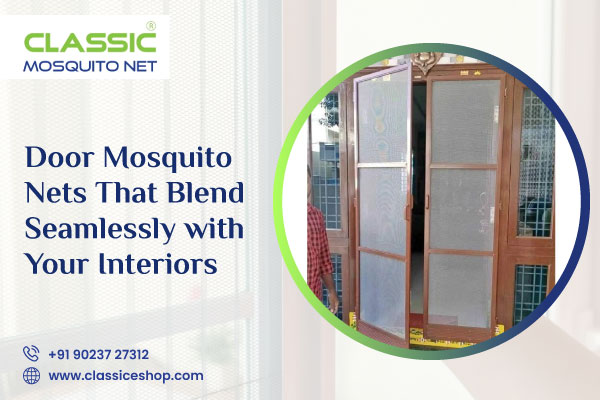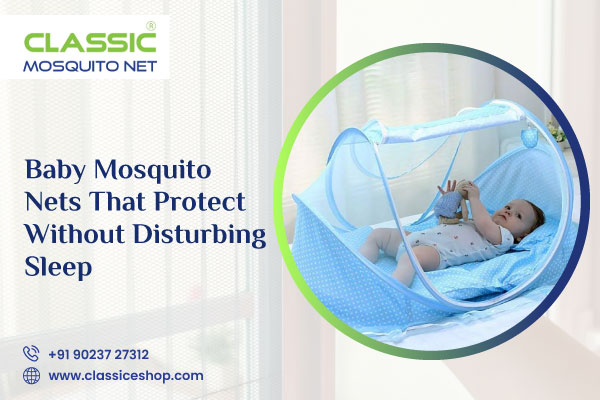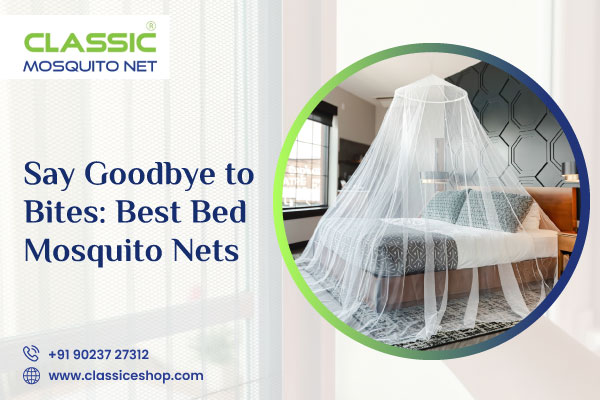As a parent, keeping your baby safe from mosquitoes is a priority. These tiny insects can pose a serious risk to your baby’s health, transmitting diseases like malaria, dengue, and the Zika virus. Babies are particularly vulnerable to mosquito bites because of their sensitive skin and underdeveloped immune systems. It is essential to take proactive steps to protect them from these pests. Thankfully, there are various methods to shield your baby from mosquito bites and the harmful diseases they may carry. From natural repellents to proper clothing and mosquito nets, this guide will explore effective ways to keep your baby safe from mosquitoes.
Before using the safety precautions, it’s essential to understand why protecting your baby from mosquitoes is so important. Mosquitoes are more than just an annoying nuisance; they are vectors of several serious diseases. For example:
- Malaria: Malaria is a disease caused by an infection that spreads by mosquito bites. Babies are especially vulnerable to malaria, which can lead to severe health issues, including high fever, anemia, and in some cases, death.
- Zika Virus: The Zika virus can be spread by mosquitoes and poses a significant risk to babies, especially during pregnancy. Infection during pregnancy can lead to severe birth defects, including microcephaly, which causes the baby’s head to be abnormally small and can result in brain damage.
- Dengue Fever: Dengue fever, another mosquito-borne disease, can produce serious symptoms resembling the flu and, in severe cases, a hemorrhagic fever. Although babies are not the primary victims of this disease, they are still at risk of contracting it if they are bitten by an infected mosquito.
The health risks posed by mosquitoes are significant, making it vital to protect your baby from these pests.
Tips for Protecting Babies from Mosquitoes
Using Natural Repellents
Natural repellents can be an effective way to keep mosquitoes at bay without exposing your baby to harsh chemicals. Two of the most commonly recommended natural mosquito repellents are:
- Lemon Eucalyptus Oil: This oil has been demonstrated to be just as efficient as DEET in repelling mosquitos. It’s safe to use on babies older than 2 months. To use, dilute a few drops of lemon eucalyptus oil in a carrier oil (like coconut oil) and apply it to your baby’s exposed skin.
- Citronella: Citronella is another natural repellent commonly used in mosquito candles and sprays. It’s a safe option for babies when used in low concentrations. Ensure that you use it in a well-ventilated area to avoid overwhelming your baby’s sensitive respiratory system.
When applying natural repellents, avoid using them on babies younger than two months. Always patch-test any product on a small area of skin to check for any allergic reactions.
Dressing Your Baby Appropriately
Dressing your baby in the right clothing can also play an important role in preventing mosquito bites. Consider the following tips:
- Long Sleeves and Pants: Covering your baby’s arms and legs helps protect their skin from mosquito bites. Choose lightweight, breathable fabrics such as cotton to avoid overheating.
- Light-Colored Clothing: Mosquitoes are attracted to dark colors. Dressing your baby in light-colored clothing makes it easier to spot any mosquitoes that may land on your baby. Additionally, bright colors can distract mosquitoes and reduce the chances of a bite.
It’s essential to avoid overly tight clothing, as mosquitoes may still be able to bite through the fabric. Ensuring that your baby is well-covered but comfortable is key.
Using Mosquito Nets
Mosquito nets are one of the most efficient ways to protect your infant from mosquitoes. These nets are specifically designed to create a barrier between your baby and the pests. Here’s how to use them effectively:
- For Baby Cribs: Ensure that your baby’s crib is covered with a mosquito net to create a protective environment while they sleep. To keep mosquitoes out, make sure the net is properly attached.
- For Strollers: Use a mosquito net for your baby’s stroller when you’re outside. This ensures that while your baby enjoys the fresh air, they are protected from mosquitoes.
- Proper Installation: Make sure the mosquito net fits snugly around the crib or stroller. There should be no holes where mosquitoes may enter.
When purchasing a mosquito net for your baby, ensure that it is made from fine mesh to effectively block even the tiniest insects.
Avoiding Mosquito-Prone Areas
Another way to protect your baby from mosquitoes is by avoiding areas where they are most likely to be found. These include:
- Stagnant Water: Mosquitoes breed in stagnant water, so avoid walking or sitting near areas like ponds, marshes, and uncleaned pools.
- Dusk and Dawn: Mosquitoes are most active during dawn and dusk. Try to keep your baby indoors during these times, especially if you’re in a high-risk area for mosquito-borne diseases.
Instead, opt for locations with proper air circulation or places that are well-screened to minimize your baby’s exposure to mosquitoes.
Additional Precautions
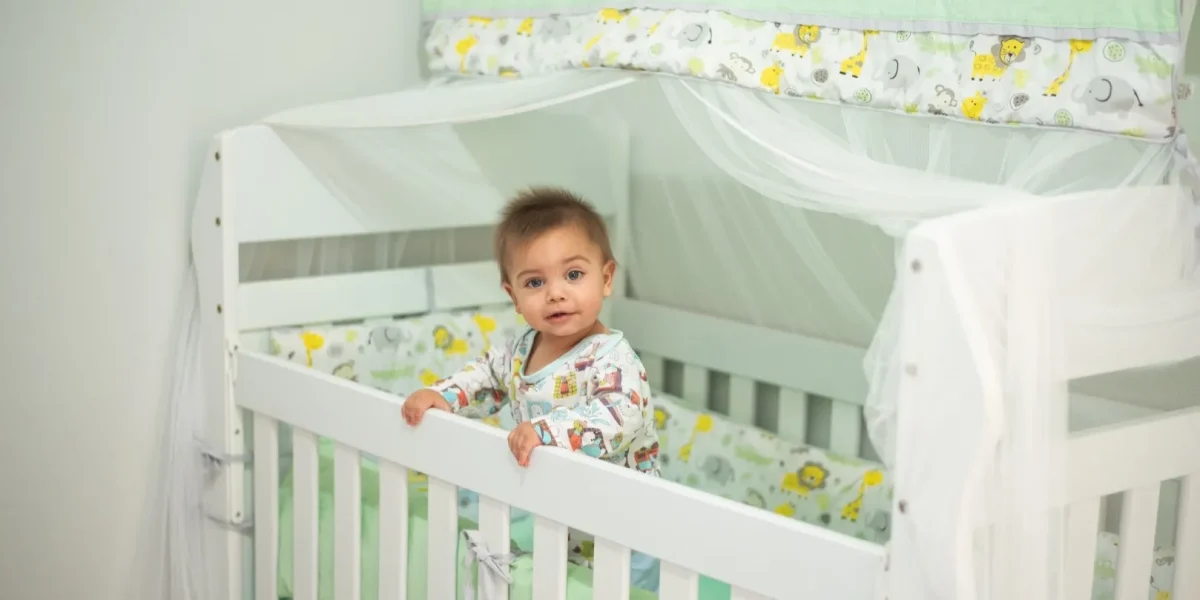
Keeping the Home Mosquito-Free
Aside from protecting your baby when you’re outdoors, it’s important to make sure your home is mosquito-free. Here’s how you can do this:
- Eliminate Standing Water: Check your home regularly for places where water can accumulate, such as flower pots, vases, or sinks. Empty or cover these areas to prevent mosquitoes from breeding.
- Use Mosquito Traps: Consider using electric mosquito traps or citronella candles around your home. These can help reduce the number of mosquitoes in the area.
- Install Screens: Install window and door screens to ensure that mosquitoes cannot enter your home. If possible, use an air conditioner to create an environment where mosquitoes are less likely to thrive.
Consulting a Pediatrician
Before using any mosquito repellent or product, it’s a good idea to consult with your pediatrician, especially if your baby has sensitive skin or a history of allergies. Your doctor can advise you on the safest products for your baby and offer personalized recommendations for additional protection.
Where to Buy Baby Mosquito Net?
When it comes to protecting your baby from mosquitoes, Classic Mosquito Net offers the best quality baby mosquito nets. Their products are designed with safety and comfort in mind, providing a secure barrier against mosquitoes. Made from fine mesh and non-toxic materials, these mosquito nets ensure your baby remains safe and free from harmful bites while sleeping or playing. Classic Mosquito Net offers a range of sizes and styles to fit cribs, strollers, and other baby equipment. With competitive prices and high-quality materials, you can choose Classic Mosquito Net to provide reliable protection for your little one. Purchase your baby mosquito net at a discounted price today and ensure your baby’s safety from mosquitoes.
Conclusion
Protecting your baby from mosquitoes is essential for their health and safety. By following these tips, such as using natural repellents, dressing your baby appropriately, and using mosquito nets, you can ensure that your little one is well-protected from harmful mosquito-borne diseases. Prioritizing your baby’s safety is a step toward a healthier, more comfortable environment. Don’t wait until it’s too late—take action today to protect your baby from the dangers of mosquitoes. For high-quality mosquito nets and other safety solutions, contact Classic Mosquito Net at +91 90237 27312.
FAQ
Why is it necessary to protect newborns against mosquitos?
Mosquitoes may spread severe diseases such as malaria, dengue fever, and the Zika virus. Babies are particularly vulnerable, so protecting them with proper precautions ensures their safety and health.
What are natural mosquito repellents for babies?
Natural repellents such as citronella and lemon eucalyptus oil can help keep mosquitoes away. Always reduce these oils and test on a tiny skin area before using them on your infant.
How should I dress my baby to avoid mosquito bites?
To protect your baby’s skin, dress him in shirt sleeves and pants. Light-colored clothing is ideal, as mosquitoes are more attracted to dark colors. Ensure clothing is breathable for comfort.
What type of mosquito net is best for babies?
Use fine-mesh mosquito nets for cribs and strollers. The net should be securely fitted to prevent gaps and ensure complete protection against mosquitoes while your baby sleeps or rests.
When is the best time to avoid outdoor activities with my baby?
Mosquitoes are most active during dawn and dusk. Try to keep your baby indoors during these peak mosquito activity times to minimize exposure to potential bites.
Can I use mosquito coils around my baby?
It’s best to avoid using mosquito coils around babies, as they may release harmful smoke. Opt for safer alternatives, like mosquito nets or baby-safe repellents, for better protection.
How do I keep my home mosquito-free?
Eliminate standing water, use mosquito screens on windows and doors, and use mosquito traps or repellents indoors. Regular cleaning and ensuring there are no breeding grounds will keep mosquitoes out.
What should I do if a mosquito bites my baby?
If your kid has been bitten, clean the affected area with gentle soap and water. Apply a baby-friendly anti-itch cream to relieve discomfort. If there’s swelling or redness, consult your pediatrician.
How can I ensure that mosquito nets are safe for my baby?
Choose mosquito nets made from breathable, non-toxic materials with fine mesh. Make sure the net fits snugly around the baby’s crib and there are no openings where mosquitoes can enter.
Can I use insect repellent on my baby?
For babies under 2 months, avoid chemical repellents. For older babies, use baby-safe, natural repellents. Always follow product guidelines, apply sparingly, and avoid applying on the face or near the hands.





